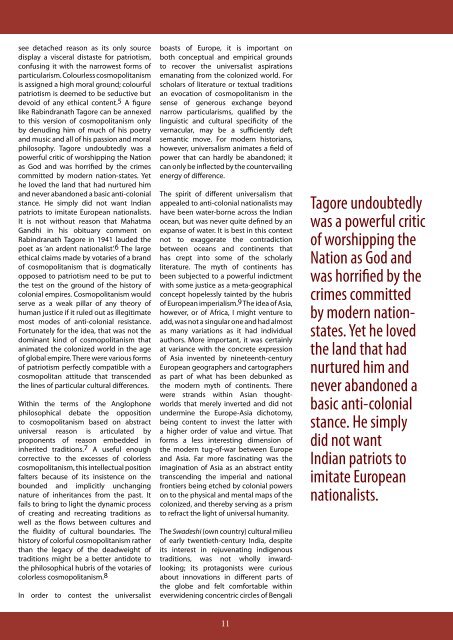You also want an ePaper? Increase the reach of your titles
YUMPU automatically turns print PDFs into web optimized ePapers that Google loves.
see detached reason as its only source<br />
display a visceral distaste for patriotism,<br />
confusing it with the narrowest forms of<br />
particularism. Colourless cosmopolitanism<br />
is assigned a high moral ground; colourful<br />
patriotism is deemed to be seductive but<br />
devoid of any ethical content.5 A figure<br />
like Rabindranath Tagore can be annexed<br />
to this version of cosmopolitanism only<br />
by denuding him of much of his poetry<br />
and music and all of his passion and moral<br />
philosophy. Tagore undoubtedly was a<br />
powerful critic of worshipping the Nation<br />
as God and was horrified by the crimes<br />
committed by modern nation-states. Yet<br />
he loved the land that had nurtured him<br />
and never abandoned a basic anti-colonial<br />
stance. He simply did not want Indian<br />
patriots to imitate European nationalists.<br />
It is not without reason that Mahatma<br />
Gandhi in his obituary comment on<br />
Rabindranath Tagore in 1941 lauded the<br />
poet as ‘an ardent nationalist’.6 The large<br />
ethical claims made by votaries of a brand<br />
of cosmopolitanism that is dogmatically<br />
opposed to patriotism need to be put to<br />
the test on the ground of the history of<br />
colonial empires. Cosmopolitanism would<br />
serve as a weak pillar of any theory of<br />
human justice if it ruled out as illegitimate<br />
most modes of anti-colonial resistance.<br />
Fortunately for the idea, that was not the<br />
dominant kind of cosmopolitanism that<br />
animated the colonized world in the age<br />
of global empire. There were various forms<br />
of patriotism perfectly compatible with a<br />
cosmopolitan attitude that transcended<br />
the lines of particular cultural differences.<br />
Within the terms of the Anglophone<br />
philosophical debate the opposition<br />
to cosmopolitanism based on abstract<br />
universal reason is articulated by<br />
proponents of reason embedded in<br />
inherited traditions.7 A useful enough<br />
corrective to the excesses of colorless<br />
cosmopolitanism, this intellectual position<br />
falters because of its insistence on the<br />
bounded and implicitly unchanging<br />
nature of inheritances from the past. It<br />
fails to bring to light the dynamic process<br />
of creating and recreating traditions as<br />
well as the flows between cultures and<br />
the fluidity of cultural boundaries. The<br />
history of colorful cosmopolitanism rather<br />
than the legacy of the deadweight of<br />
traditions might be a better antidote to<br />
the philosophical hubris of the votaries of<br />
colorless cosmopolitanism.8<br />
In order to contest the universalist<br />
boasts of Europe, it is important on<br />
both conceptual and empirical grounds<br />
to recover the universalist aspirations<br />
emanating from the colonized world. For<br />
scholars of literature or textual traditions<br />
an evocation of cosmopolitanism in the<br />
sense of generous exchange beyond<br />
narrow particularisms, qualified by the<br />
linguistic and cultural specificity of the<br />
vernacular, may be a sufficiently deft<br />
semantic move. For modern historians,<br />
however, universalism animates a field of<br />
power that can hardly be abandoned; it<br />
can only be inflected by the countervailing<br />
energy of difference.<br />
The spirit of different universalism that<br />
appealed to anti-colonial nationalists may<br />
have been water-borne across the Indian<br />
ocean, but was never quite defined by an<br />
expanse of water. It is best in this context<br />
not to exaggerate the contradiction<br />
between oceans and continents that<br />
has crept into some of the scholarly<br />
literature. The myth of continents has<br />
been subjected to a powerful indictment<br />
with some justice as a meta-geographical<br />
concept hopelessly tainted by the hubris<br />
of European imperialism.9 The idea of Asia,<br />
however, or of Africa, I might venture to<br />
add, was not a singular one and had almost<br />
as many variations as it had individual<br />
authors. More important, it was certainly<br />
at variance with the concrete expression<br />
of Asia invented by nineteenth-century<br />
European geographers and cartographers<br />
as part of what has been debunked as<br />
the modern myth of continents. There<br />
were strands within Asian thoughtworlds<br />
that merely inverted and did not<br />
undermine the Europe-Asia dichotomy,<br />
being content to invest the latter with<br />
a higher order of value and virtue. That<br />
forms a less interesting dimension of<br />
the modern tug-of-war between Europe<br />
and Asia. Far more fascinating was the<br />
imagination of Asia as an abstract entity<br />
transcending the imperial and national<br />
frontiers being etched by colonial powers<br />
on to the physical and mental maps of the<br />
colonized, and thereby serving as a prism<br />
to refract the light of universal humanity.<br />
The Swadeshi (own country) cultural milieu<br />
of early twentieth-century India, despite<br />
its interest in rejuvenating indigenous<br />
traditions, was not wholly inwardlooking;<br />
its protagonists were curious<br />
about innovations in different parts of<br />
the globe and felt comfortable within<br />
everwidening concentric circles of Bengali<br />
11<br />
Tagore undoubtedly<br />
was a powerful critic<br />
of worshipping the<br />
Nation as God and<br />
was horrified by the<br />
crimes committed<br />
by modern nationstates.<br />
Yet he loved<br />
the land that had<br />
nurtured him and<br />
never abandoned a<br />
basic anti-colonial<br />
stance. He simply<br />
did not want<br />
Indian patriots to<br />
imitate European<br />
nationalists.


